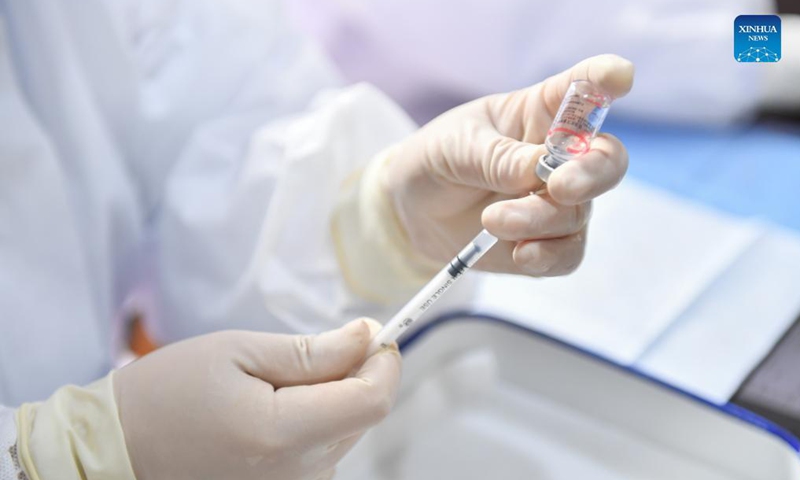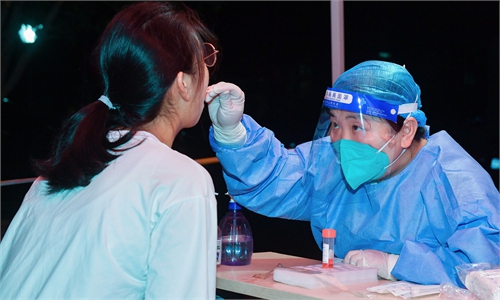Chinese experts call for more innovative vaccines amid expansion of COVID sub-variant

A medical worker prepares a booster shot of the COVID-19 vaccine at a community service center in Tianxin District of Changsha, central China's Hunan Province, Oct. 26, 2021.Photo:Xinhua
Chinese experts have called for more new-generation vaccines to provide more protection against infections after the rapidly mutating novel coronavirus as a new sub-variant of Omicron, identified as BA.2.75, which shows a distinct growth advantage, was found in several countries.
First detected in India in early June, the sub-variant has also reportedly been found in at least seven other countries, including Japan, Canada and the UK in just a few weeks.
According to the Indian Express, BA.2.75, which belongs to the BA.2 sub-lineage, the dominant strain in India earlier this year, has been found to have an 18 percent growth advantage over the other Omicron sub-variants.
The sub-variant was detected amid a recent surge of cases in India. Indian scientists picked out BA.2.75 together with two other sub-variants, BA.2.74 and BA.2.76, as the possible drivers for the current surge. These three sub-variants have more than nine changes in the spike protein, and are expected to outnumber the BA.4 and BA.5 sub-variants which were the most common until a few weeks ago, India media reported.
Although no evidence has been found as of now to suggest that the BA.2.75 also causes a more severe form of infection, scientists around the world called for close attention to be paid to what some experts called "a second generation variant", as it has a large number of spike mutations, two of them quite significant, and also because it is being seen in geographically diverse locations.
The mutations are distinct from BA.5 and BA.2.75 and could result in yet another wave as BA.5 immunity might not protect people from it, Elling Ulrich, a scientist form the Institute of Molecular Biotechnology under the Austrian Academy of Sciences, said on Twitter on Sunday.
Chinese experts are also paying close attention to the new sub-variant as the country is battling nationwide sporadic outbreaks.
An expert from the Chinese national disease control and prevention system told the Global Times that China had not produced any direct data on BA.2.75 as it had not entered the country, but Chinese authorities and experts would closely follow information on it. And if it does enter the country someday, Chinese experts would quickly conduct research and trials on it to define how to deal with it.
Zhuang Shilihe, a Chinese expert who closely follows public health issues, told the Global Times on Tuesday that it is still uncertain whether the sub-variant would dominate cases in India, but we should be aware that more so-called second generation variants will inevitably come.
An immunologist in Beijing warned that the possibility could not be ruled out that the BA.2.75 sub-variant would cause a new wave of infections, and said that the novel coronavirus would continue to mutate.
"It is hard to tell how would the virus mutate, but one of my biggest worries is that the host range of the novel coronavirus would expand, for example, it can be transmitted among humans and their pets. That would be a big problem," the immunologist told the Global Times on Tuesday.
A veterinarian in Thailand likely contracted the coronavirus from an infected pet cat last year, researchers concluded in a new study released in June 29 on Nature magazine. It is the first documented case of suspected cat-to-human transmission, although experts stress that the risk of cats infecting humans with the virus remains low overall, media reported.
Facing the threat, experts called for new-generation vaccines that are more efficient to prevent infections.
The quick development of Chinese COVID-19 vaccines has brought more innovative types of jabs into phase I and II clinical trials, and many of them have a better efficacy than traditional inactivated shots.
Chinese vaccine developer CanSinoBIO announced that its COVID-19 mRNA vaccine has received approval for clinical trials in China.
China National Pharmaceutical Group also said its second-generation recombinant protein COVID-19 vaccine had received approval for clinical trials.
Wei Wensheng, a professor at the School of Life Sciences, Peking University, previously told the Global Times that a team under his leadership had designed a circular RNA (circRNA) vaccine that is able to induce effective neutralizing antibodies against dominating Omicron variants in animal testing. Wei suggested the circRNA-Delta vaccine could be developed into broad-spectrum candidate vaccines.


